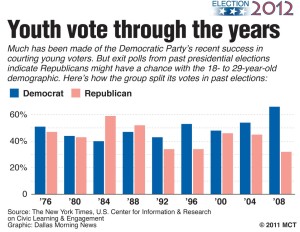Despite the weighty responsibility of the right to vote in the face of the disenfranchised masses as part of our civic duty to the United States of America, there are plenty of scenarios in which voting is a waste of time.
With presidential elections coming up in less than a year and Republican primary campaigning already well under way, expect to begin hearing the clamor of people urging you to vote yet again.
While suffrage is without a doubt an important concept in our society and a right which should be exercised (I definitely will come 2012), it is in reality only a right and not a responsibility.
As such, for the individual, the benefits and costs of voting should be weighed, and you might be surprised to find that the costs of suffrage can dominate. If that is the case then we can apply the theory of rational ignorance to the political process.
According to an economic brief made available by the Strom Thurmond Institute, the theory of rational ignorance states, “When the cost of acquiring information is greater than the benefits to be derived from the information, it is rational to be ignorant.”
So, let us use the theory in looking at a fictional CSU East Bay student to exemplify a hypothetical, but hopefully realistic, instance in which it makes sense to remain ignorant of a political issue.
If our student attends CSUEB full-time, works part-time, and has to commute to and from school, work, and home, that can take up approximately 64 hours out of the week. Then, since the average person from the ages of 20-24 sleeps about 9.4 hours each night, according to the U.S. Bureau of Labor Statistics, we lose another 65.8 hours. Finally, based on the American Time Use Survey, we spend about 14 hours per week on household activities.
That leaves us with about 3.5 hours per day of leisure time, which is usually dominated by TV, sports, socializing, reading, and other activities, according to the same survey.
It is during leisure time in which we must decide whether our student should engage in the political process and sacrifice some of those aforementioned activities. This assumes that expected earnings from college, current earnings from work, and necessity of daily activities outweigh the benefits of voting.
Important factors to be aware of for deciding to be active politically can include knowing the details of an issue, how much of an impact voting on it will have, and whether voting on the issue will impact the student.
Few things may directly impact our college student, who might not be heavily invested in the system since they may not worry about income tax, property tax or other government functions by virtue of being a poor college student.
Without already being interested in politics it could take a substantial amount of time to get well informed making it more costly to learn about an issue. Assistant Professor of Political Science Dr. Maria Ortuoste estimates that it can take more than two to eight hours to adequately understand a single issue.
The problem is eight hours vastly exceeds our hypothetical time to spare on politics, to the extent that the value gained in making a political decision causes the student to lose out on their valued leisure time to the point where they may no longer be rationally using their time.
So, it is when you look at those 3.5 hours per day and decide that having a say in how your state redistricts or taxes properties you don’t own costs too much time, it makes sense to be rationally ignorant.
On the other hand, “Maybe spending at least four hours actually looking at an issue in depth might save one big problems in the future. Think of Proposition 8 and what’s happening now. Think of the old proposition which froze property taxes in California – great in the short term, but what is happening to our schools?,” Ortuoste questions.
Having a good idea of what the cost-to-benefit ratio is will help you figure out if the issue concerns you enough to invest the time in it.
So, next time someone accuses you of being an intemperate or apathetic youth, just tell them you’re only following along with the theory of rational ignorance to most effectively use your time, if you can justify the costs.
Besides, while knowing about deadly bacteria may be important overall and save lives, it doesn’t mean everyone becomes a bacteriologist. You have to allocate your time effectively, and that’s why rational ignorance in politics means sometimes not bothering to vote.












